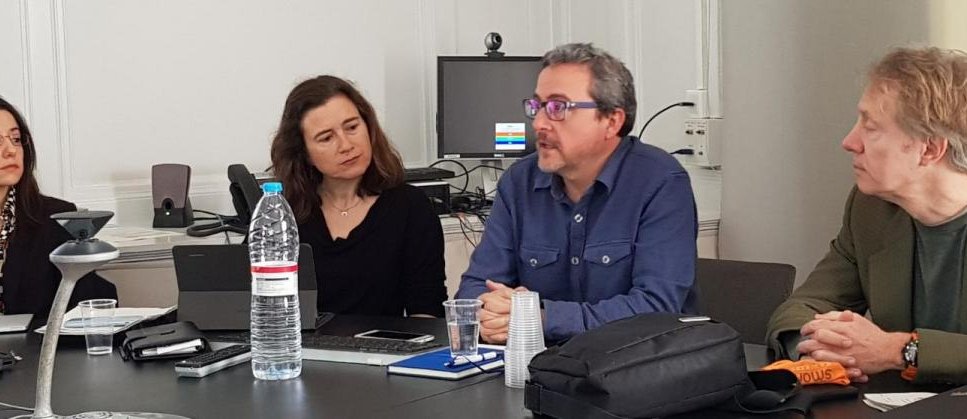“Fair play” in scientific publication
Subject: Multidisciplinary
The publishers of the UOC’s academic journals joined sociologist, philosopher and researcher from the CSIC, Fernando Aguiar, to reflect on ethical considerations in the world of scientific publication.
In 1998, the press gave wide coverage to a study published in the prestigious journal The Lancet linking the MMR viral vaccine with autism, which resulted in many parents around the world refusing to vaccinate their children. Just six years later, journalist Brian Deer uncovered the truth; the study had been funded by a law firm and the results were false.
This well-known case formed the subject of the opening address for the UOC’s 5th Scientific Publishing Seminar given by the University’s Vice President for Strategic Planning and Research, Marta Aymerich. This case, which represents the epitome of serious praxis error and irreversible consequences, provided the perfect starting point for a discussion on the ethics of scientific publishing.
Fernando Aguiar, a researcher at the CSIC’s Institute of Philosophy, then gave a presentation on the values, distortion and transformation of the publication system, providing anecdotes and case studies based on his own professional experience as director of one of Spain’s leading sociology magazines: the Revista Internacional de Sociología (International Sociology Journal, RIS).
Publishing, the good and the bad
Aguiar assumed a positive approach in terms of ethics in publishing: “When we consider the moral or ethical issues of publishing, we tend to think of negatives aspects rather than the positive values that underpin the publishing system. These remain in the background and, as publishers, we need to protect them”.
To that end, Aguiar began his talk by listing the moral and institutional values of an ideal publication system before going on to point out the factors with the potential to undermine them.
- Impartiality (equal assessment for all), merit, effort and originality (preventing fraud, plagiarism or copying), were the moral values he cited as being central to ensuring “fair play” and developing a “just system”.
- The expert also outlined the basic ethical code required to cultivate the professional practices of researchers. He started with the theory of sociologist Robert K. Merton: recording, certification, dissemination, conservation and, recently, assessment as well. These values are based on the desire for recognition, and it is at this point that the emotional factor comes into play in relation to moral values.
System distortion
Based on the framework of this model, Aguiar identified the moral and ethical issues related to scientific publication, the potential distortions to the system on the part of all the stakeholders involved in publishing across all stages: assessment, measurement and diffusion.
- To begin with, authors may succumb to plagiarism, autoplagiarism, false authorship, attempts to pressure publishers or the use of personal influence. Similarly, publishers may show bias or be drawn into the theft of an idea, and reviewers could fall into the trap of endogamy or conservatism, which would impede innovation and risk-taking.
F. Aguiar introduce en el V Seminario de Ed. Científica @UOCuniversity un interesante debate sobre ética de al publicación: el #plagio y el auto plagio están en el centro del debate y surgen preguntas. Es excesivo el término "plagio"? Deberían actuar los editores ante el plagio?
— ETHE Journal (@ETHEjournal) March 14, 2019
- In terms of measurement, distortions can occur in the form of reference networks, pressure groups or an excess of qualitative fervour, which Aguiar emphasized with the example of a Forges cartoon poking fun at the academic world’s preoccupation for having articles published in journals belonging to the Journal Citation Report (JCR).
"El evaluador es un asesor de la revista y no debería ser solamente suya la decisión final, que es de la revista y ésta tiene que tener un margen de decisión. Esto permite asumir más riesgos, novedad, innovaciones" Fernando Aguiar en V Seminario de Edición Científica #peerreview
— ETHE Journal (@ETHEjournal) March 14, 2019
- Finally, diffusion can be influenced by the commercialization of knowledge or the activities of predatory journals. Another important factor to consider is the secondary status of the book in favour of the article.
"El evaluador es un asesor de la revista y no debería ser solamente suya la decisión final, que es de la revista y ésta tiene que tener un margen de decisión. Esto permite asumir más riesgos, novedad, innovaciones" Fernando Aguiar en V Seminario de Edición Científica #peerreview
— ETHE Journal (@ETHEjournal) March 14, 2019
The guest speaker provided several examples of situations he had personally observed over the course of his five years as director of the Revista Internacional de Sociología.
The transformational process
Aguiar went on to suggest alternatives to the current publishing model through the introduction of changes that promote the preservation of its virtues, before commenting on the pros and cons of adopting alternatives to the impact indexes and the predominance of qualitative assessment.
Concluding with a review of the points of the San Francisco Declaration on Research Assessment (DORA) and the Leiden Manifesto for Research Metrics, the informative lecture sparked numerous questions, making for a lively hour-long final Q&A session, featuring the participation of all the journal representatives in attendance.
En Seminario Edición Científica @UOCuniversitat Fernando Aguiar @CSIC se interroga sobre gestión de rev científicas por parte de @SpringerNature et al. ¿Si aceptamos con satisfacción la externalización de edición de libros académicos, por qué resistencia en revistas?
— Ciro Llueca (@cirollueca) March 14, 2019
This marks the fifth in a series of scientific publishing seminars organized by Library and Learning Resources and coordinated by Elsa Corominas at the UOC.


